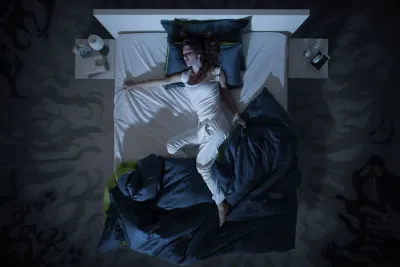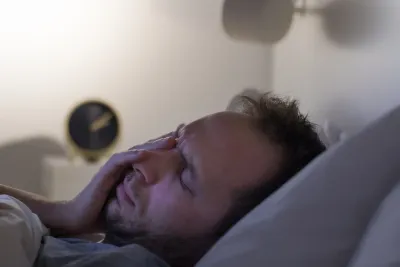Caffeine and Sleep: The Impact on The Quality of Your Sleep
Chilipad Editorial Team • Jan 23, 2024

Key Takeaways
Caffeine can be a powerful alertness tool, but poor timing or overuse can quietly sabotage sleep quality.
- Caffeine blocks adenosine, the chemical that helps your body feel sleepy, making it harder to fall asleep and stay asleep.
- Timing matters most. Limiting caffeine at least six to eight hours before bed helps protect nighttime sleep.
- Sensitivity varies widely—how caffeine affects sleep depends on dose, frequency, and individual biology.
- Moderation is key. If sleep suffers, swapping to decaf or herbal options later in the day can help maintain balance.
Like many, you might have to rely on some form of caffeine, whether it’s morning coffee or an afternoon soft drink, to help power you through the day.
Sure, we love our morning coffee, but how does caffeine affect sleep? Are you aware that it can significantly impact the overall quality of? It’s true! We’re not saying that you need to stop drinking your morning coffee or other caffeinated drinks; we’re only letting you know that it can significantly affect your sleep.
It’s reported that 7 in 10 people drink coffee every week, and 62% drink coffee daily. [1] And it’s estimated that 63% of adults have some form of sugar-sweetened drink once or more daily. That’s a lot of caffeine! [2]
Note: Sipping coffee late at night, just as your body’s gearing up to power down, can throw off your circadian rhythm and disrupt your natural sleep-wake cycle.
Below, we’ve included everything you need to know about the connection between consuming caffeine and nighttime sleep and how to make subtle changes that can substantially improve your sleep. But first, we’ll need to understand how it affects by learning how it works in the body.
How Caffeine Works in the Body
After being consumed, caffeine quickly enters the bloodstream through the digestive system. The liver then processes it and transforms it into various substances that can impact the functioning of different organs.
However, caffeine's most significant effect is on the brain. Caffeine is a stimulant that acts on the central nervous system by blocking the effects of adenosine, a natural chemical that helps regulate sleep.
Read More: Drinks That Can Help You Sleep Better
Adenosine builds up in the body throughout the day and signals the brain to start winding down for sleep.
When it blocks adenosine receptors, it can make you feel more alert and awake but also interfere with light sleep and your ability to fall asleep or stay asleep. [3]
Sleep Study: Currently, 80% of people worldwide consume a product containing caffeine daily, which increases to 90% among adults in North America. [4]
Don’t Let Temperature Affect Your Sleep
Award winning bed cooling systems and cooling mattress toppers help you get the quality sleep you crave.

Can Caffeine Keep You Awake?
We all have caffeine abstinence and know it can give us a much-needed boost when we're tired, helping us feel more alert and focused. Caffeine can improve cognitive functions like memory and attention, which can be especially helpful for sleep-deprived individuals.
While caffeine may improve cognitive performance, to some extent, it cannot completely reverse the effects of long-term sleep loss.
Eating late in the day has been shown to mess with some people’s ability to drift off or settle into sleep mode. resulting in a restless night and leaving you feeling even more tired the next day.
Have you ever wondered why a cup of coffee occasionally seems to do wonders for keeping you awake and alert while other times it doesn't seem to? The truth is that the effects of caffeine can vary from person to person and depend on various factors.
For example, how much you consume, how often you drink caffeine and even your genetic makeup can all impact how caffeine keeps you awake when you're tired. Interested in learning how your genes affect your caffeine sensitivity?
Even though your genetics may grant you a higher caffeine tolerance, it's important to track the actual quality of your sleep using a sleep tracker.
Remember, just because you can drift of to sleep easily doesn't necessarily mean you're getting high-quality rest.
So, while caffeine can be a valuable tool for boosting alertness and energy, it's important to know that each individual's effects may differ.
Did You Know: As a general guideline, if you work a 9-5 job and usually sleep at a regular time, it is recommended that you avoid consuming caffeine after 2 or 3 p.m. [5]
Caffeine Impact on Sleep
Caffeine intake might delay sleep onset at bedtime, shorten total sleep duration, and leave you feeling less rested. Additionally, it can diminish the quantity of deep sleep, slow-wave sleep you experience, which is vital for feeling refreshed the following day.
Caffeine works by blocking the adenosine receptors in the brain. During waking hours, the brain produces adenosine, which promotes sleep. As we stay awake, adenosine levels build up in the brain, making us feel tired.
When we consume caffeine, it blocks this process, keeping us alert and attentive. This is also why caffeine intake can disrupt our sleep.
Did You Know: Typically, it has a half-life that can vary from 2 to 12 hours.
We’ll highlight the common effects, including:
Difficulty Falling Asleep
Caffeine can make it harder to fall asleep when you want to, even if you feel tired. When we are unable to relax and calm our minds, we can toss and turn in bed, eventually leading to less sleep.
As explained earlier, it works by blocking adenosine, a neurotransmitter that promotes sleep and reduces arousal. This leads to an increase in alertness and makes it difficult to relax and get to sleep.
To avoid having a reduced total sleep time, it is recommended to consume coffee (107 mg per 250 mL) at least 8.8 hours prior to bedtime.
Did You Know: The effects of consuming caffeine typically begin after around 30 minutes and may last up to five hours. [6]
Reduced Sleep Quality
Although caffeine can help us stay alert and focused during the day, it can negatively impact the quality of our sleep. Even if you can sleep after consuming caffeine, it may still disrupt your natural sleep cycle, reducing the amount of deep sleep and restorative sleep you get.
This can leave you feeling tired and less refreshed in the morning. If you find that caffeine is interfering with your sleep, consider cutting back on your intake or avoiding it altogether in the hours leading up to bedtime.
Ongoing sleep deprivation can cause excessive daytime sleepiness that even caffeine cannot counteract.
Sleep Tip: If you usually go to bed at 10 p.m., try to avoid consuming caffeine after 2 p.m. as it may help reduce potential sleep problems.
More Nighttime Sleep Disturbances
If you tend to wake up frequently during the night, making it difficult to fall back to sleep, this could be a possible culprit for sleep disruption. If you're experiencing frequent nighttime awakenings, try cutting back and see if that makes a significant differences.
You may also want to experiment with drinking decaf or caffeine-free beverages in the evening to promote better sleep.
Increased Insomnia Symptoms
Yes, it can potentially increase symptoms. Consuming it can interfere with our body's natural sleep-wake cycle and make it harder to fall or stay asleep.
So, if you struggle with insomnia, it's important to take coffee beans, be mindful of your intake, and avoid it in the afternoon and evening. Limiting large amounts of caffeine or switching to decaf or other caffeine-free beverages may also help alleviate your symptoms.
Did You Know: Among the various drinks that help you sleep, soothing herbal teas are a popular choice for their calming properties and ability to promote relaxation.
Additionally, unlike coffee, black tea has less caffeine and is less likely to keep you wired—so you can sip without sabotaging your sleep.
To learn more about various sleep disorders and their effects on mental health, visit our blog: Understanding the Common Sleep Disorders.
Balancing Caffeine for Improved Sleep
While caffeine can be a useful aid for maintaining alertness and focus throughout the day, it's crucial to be mindful of the quantity and timing of its consumption. Here are some suggestions for optimizing your caffeine habits to improve the quality of your sleep:
Avoid Caffeine Afternoon and Evening
If you struggle to get a good night's sleep, it's important to pay attention to your caffeine consumption.
Caffeine, whether in coffee, tea, soda, or energy drinks, can significantly impact the quality of your sleep.
To minimize caffeine's impact on sleep, it's best to avoid consuming it for several hours before bedtime. Experts recommend finishing your last caffeinated beverages or energy drinks at least six hours before you go to sleep.
This will give your body enough time to process the caffeine and reduce its effects on your sleep.
Additionally, it's important to note that caffeine affects everyone differently, so paying attention to your body's response to caffeine and adjusting your consumption is important.
Choose Decaf or Herbal Teas
If you enjoy a warm drink before bed, try alternatives to coffee or regular tea. You could try decaffeinated coffee, which is without the caffeine that can disrupt your sleep.
Herbal teas like chamomile, lavender, and peppermint are caffeine-free alternatives.
Not only do these teas offer a warm and soothing experience, but they may also have properties that can help you relax and sleep better.
By choosing these caffeine-free options, you can enjoy a warm beverage while ensuring that you have a better night's sleep.
Practice Good Sleep Hygiene Habits
In addition to being mindful of your caffeine consumption, it's important to practice good sleep hygiene habits to maximize your chances of getting quality sleep.
One way is to avoid screens before bed, as the blue light emitted by electronic devices can interfere with your natural sleep-wake cycle.
It's also important to maintain a consistent sleep schedule by going to bed and waking up at the same time every day, even on weekends.
Creating a calming bedtime routine sets the stage for a smoother wind-down—and a consistently a good night’s rest. This can involve pre-bedtime activities such as taking a warm bath, reading a book, or practicing relaxation techniques like meditation and deep breathing exercises.
By adopting good sleep hygiene habits, you can feel refreshed and energized.
Related Blog: Understanding REM Sleep
Monitor Your Caffeine Intake
If you're unsure how much you consume daily, consider tracking your intake for a few days to understand your habits better.
This practice can help you better understand your consumption habits and make more informed choices about when and how much to consume.
To assist you in your tracking efforts, we have included a helpful chart below that lists popular drinks and their associated caffeine content.
By referring to this chart, you can better manage your caffeine consumption and maintain a healthy balance in your daily routine.
How Many Hours Before Bedtime
If you enjoy a cup of coffee or tea in the morning, you might wonder when the best time to cut yourself off is to avoid sleep disruptions. Generally, experts advise avoiding it for at least eight hours before bedtime.
For example, if you typically go to bed by 10 pm, you should avoid caffeine close to bedtime, usually no later than consumption after 2 pm.
This will give your body adequate time to process and eliminate the caffeine from your system resulting in a good night's rest.
Of course, everyone's sensitivity to caffeine can vary, so you may need to try it with the timing of your caffeine consumption to determine what works best for you.
But giving yourself a caffeine cut-off time can help you get the restful, restorative sleep you need to feel your best.
How Much Caffeine is Safe to Drink
The Food and Drug Administration (FDA) suggests that consuming up to 400 milligrams of caffeine daily is generally considered safe for healthy adults. [7]
Below is a chart that highlights common drinks and approximate caffeine content.
- Brewed Coffee (8oz) = 100 - 200 milligrams
- Energy Drink (8-12oz) = 50 - 300 milligrams
- Soft Drinks (12 oz) = 0 - 70 milligrams
- Tea (8oz) = 40 - 120 milligrams

How Can You Tell if It’s Affecting Your Sleep
If you have trouble falling or feel excessively sleepy during the day, it might be a sign of caffeine overuse or dependence.
Other symptoms could include nausea, headaches chronic insomnia, or nervousness. Sometimes, these symptoms could indicate a sleep disorder or an underlying medical issue. Schedule a call with your healthcare provider.
During your conversation, your healthcare provider can help you better understand how your caffeine use and other factors may affect your sleep.
They can also guide you on reducing your caffeine intake or stopping using caffeine altogether if necessary.
If you do decide to cut back on caffeine, it is important to do so gradually to reduce the risk of withdrawal symptoms like headaches, anxiety, and poor mood. [8]
Working with your healthcare provider and reducing your caffeine intake can improve sleep efficiency and your overall quality of sleep and wake up refreshed and energized daily.
Final Thoughts
As discussed above, caffeine can be a helpful tool for staying alert and focused during the day, but it's important to be mindful of its effects on sleep.
Among the notable effects are delayed bedtime, diminished quality of sleep, disrupted sleep cycles, and sleep deprivation. Recognizing your sensitivity and moderating consumption, especially later in the day, allows you to enjoy the perks of caffeine without sacrificing a peaceful night's sleep.
With guidance from a sleep specialist and a smart approach to your daily habits, you can fine-tune your routine to maximize restful sleep and wake up feeling your best.
Frequently Asked Questions About Caffeine and Sleep
What Are the Effects of Caffeine on Sleep?
Short-term effects may include:
- Difficulty falling asleep
- Shorter sleep periods
- Overall poorer sleep quality
What Are Some Caffeine-Free Alternatives for Better Sleep?
Looking for caffeine-free ways to improve your sleep? Here are some ideas:
- Herbal teas like chamomile, lavender, and peppermint
- Warm milk
- Water
All are caffeine-free and may promote relaxation for better sleep.
Can Caffeine Cause Insomnia?
Can caffeine cause insomnia? A3: Yes, caffeine can increase insomnia symptoms by disrupting the sleep-wake cycle and making it harder to fall or stay asleep, especially if consumed in the afternoon or evening.
How Much Caffeine Is Considered Safe per Day?
The FDA suggests up to 400 mg of caffeine daily is safe for healthy adults. This is roughly 4 cups of coffee or 2 energy drinks.
Why Doesn't Coffee Keep Me Awake?
If coffee doesn’t keep you awake, your body might be playing caffeine dodgeball. Genetics can make some people metabolize caffeine so quickly it barely has time to wave at your brain before it’s gone. Chronic coffee drinkers can also build up tolerance, meaning the same dose that once had you buzzing now just keeps you baseline functional.
Peer-Reviewed Research References
-
National Coffee Association.
NCA Releases 2020 National Coffee Data Trends: The Atlas of American Coffee.
National Coffee Association, 2020.
Study Type: Industry Consumption & Trend Report
Key Finding: Coffee remains one of the most widely consumed beverages in the United States, with the majority of adults consuming caffeine daily, often across multiple servings.
-
Centers for Disease Control and Prevention (CDC).
Get the Facts: Sugar-Sweetened Beverages and Consumption.
CDC, 2018.
Study Type: Government Public Health Resource
Key Finding: High intake of sugar-sweetened beverages is linked to excess calorie consumption, metabolic health risks, and disrupted energy regulation, which can indirectly affect sleep quality.
-
O'Callaghan, F., Muurlink, O., & Reid, N.
Effects of Caffeine on Sleep Quality and Daytime Functioning.
Risk Management and Healthcare Policy, 2018.
Study Type: Narrative Review
Key Finding: Caffeine consumption was associated with reduced sleep quality, increased sleep latency, and impaired daytime functioning, particularly when consumed later in the day.
View Study
Source URL: https://doi.org/10.2147/RMHP.S156404
-
Centers for Disease Control and Prevention (CDC).
Caffeine: Reducing Risks Associated with Long Work Hours.
NIOSH, 2021.
Study Type: Occupational Health Guidance
Key Finding: While caffeine may temporarily improve alertness during extended work hours, excessive or poorly timed intake can worsen sleep disruption and fatigue over time.
-
Heckman, M. A., et al.
Caffeine in Foods: Consumption, Functionality, Safety, and Regulatory Matters.
Journal of Food Science, 2010.
Study Type: Comprehensive Scientific Review
Key Finding: Caffeine affects the central nervous system by increasing alertness and reducing perceived fatigue, but excessive intake may cause sleep disturbances, anxiety, and cardiovascular effects.
View Study
Source URL: https://ift.onlinelibrary.wiley.com/doi/10.1111/j.1750-3841.2010.01561.x
-
Drake, C., Roehrs, T., Shambroom, J., & Roth, T.
Caffeine Effects on Sleep Taken 0, 3, or 6 Hours Before Bed.
Journal of Clinical Sleep Medicine, 2013.
Study Type: Controlled Sleep Laboratory Study
Key Finding: Caffeine consumed even six hours before bedtime significantly reduced total sleep time and sleep efficiency, demonstrating its long-lasting impact on sleep.
View Study
Source URL: https://www.ncbi.nlm.nih.gov/pmc/articles/PMC3805807/
-
U.S. Food and Drug Administration (FDA).
Spilling the Beans: How Much Caffeine Is Too Much?
FDA, 2024.
Study Type: Government Consumer Health Guidance
Key Finding: The FDA advises that up to 400 mg of caffeine per day is generally safe for most healthy adults, but individual sensitivity and timing greatly influence sleep outcomes.
View Resource
Source URL: https://www.fda.gov/consumers/consumer-updates/spilling-beans-how-much-caffeine-too-much
-
Chaudhary, N. S., Grandner, M. A., Jackson, N. J., & Chakravorty, S.
Caffeine Consumption, Insomnia, and Sleep Duration.
Nutrition, 2016.
Study Type: Nationally Representative Observational Study
Key Finding: Higher caffeine intake was associated with shorter sleep duration and increased odds of insomnia symptoms in U.S. adults.
View Study
Source URL: https://doi.org/10.1016/j.nut.2016.04.005









